Thursday, July 22, 2010
In Shero We Trust
Pittsburgh Penguins' GM Ray Shero is shaping up to be somewhat of loner among his NHL GM brethren.
With the League's rejection of the record 17-year $102 million dollar contract reached between the Penguins' arch-division rival New Jersey Devils and star winger Ilya Kovalchuk, the merits (and now the legality) of long-term contracts have once again taken center stage with hockey pundits everywhere.
Of course, while Kovalchuk's since-rejected deal was a record contract in terms of length, it hasn't been the only such agreeement designed by crafty GM's as a way around the confines of the salary cap.
Chicago Blackhaws' and former Penguin winger Marion Hossa, Philadelphia Flyers' defenseman Chris Pronger, Vancouver Canucks' netminder Roberto Luongo, Detroit Red Wings' winger Henrik Zetterberg and even Boston Bruins' center Marc Savard are among the several players who have signed similar contracts -- deals which are long, but heavily front-loaded with immensely low (sometimes near the minimum) salaries in the later years of the deal, spreading out over the length of the contract the average of the total cap hit.
Not surprisingly, the league is taking a lot of criticism for voiding Kovalchuk's contract, while not doing the same for any of the deals signed by the other players I mentioned. However, I'm of the opinion -- like the league -- that Kovalchuk's contract is way above and beyond the way those other contracts were structured. It's anywhere from 5 to more than 10 years longer, AND on top of that, has much higher values of salary fluctuation.
It's one thing for a player to get about $6 million a year before having a salary drop to $1 millon per. It's another for a player to get $11.5 million for five seasons and then, just a few years later, earn about $500,000, like Kovalchuk would have if his deal was approved --- and not just for one or two seasons, but five or six.
That is, of course, if he would still be twirling around the ice at the ripe young age of 44 when his contract were to expire.
In Penguin land, there has been some criticism of Ray Shero for not signing his marquee young players -- Sidney Crosby, Evgeni Malkin, Jordan Staal, just to name 3 -- to much longer deals of similar ilk.
As it is, Crosby and Malkin were inked to 5 year extensions one year apart, while Staal signed a 4-year extension.
Shero has gone on record as saying that, in the cap world, it's all about "flexibility" for him. Something he obviously wouldn't have as much of if he ties to a player for 10 seasons.
Personally, I think Shero has it exactly right.
With the possible exception of a franchise player like Crosby or Alexander Ovechkin, deals of the 7, 10, 12 and 17 year magnitude are commitments that are too long. Too many things can happen in the interim, either with regard to the franchise, the player, the salary cap or something else. It's best not to be tied up on a fixed commitment quite that long, in my opinion.
Sure, the argument can be made that, with shorter deals, you run some risk of losing your players when their contracts expire, particularly with unrestricted agency in the league being something that players hit around 26.
And there's certainly also the argument that shorter contracts are more subject to inflationary pressures over the years.
Still, with so few players absolutlely, positively worth keeping in the fold no matter what, I think it's better not to saddle your franchise with long-term commitments you can't get out from, and maintain that flexibility to re-sign each player as circumstances dictate.
Look at all the players the Chicago Blackhawks have had to jettison in the aftermath of their Stanley Cup Championship this season. That's in part to the lengthy contracts they signed guys like Hossa, Jonathan Toews, Patrick Kane, and Duncan Keith to.
With the possible exception of Towes, and with appreciation for how good Hossa, Kane and Keith are, it would have been hard for me to commit that long to any of them if I were Hawks' GM Stan Bowman, beacuse none of those 3 are truly franchise players.
Of course, Chicago has been hurt just as much by the previous regime's decision to sign defenseman defenseman Brian Campbell and goaltender Christobal Huet to overpriced deals, but even those contracts -- while not quite front-loaded like the other deals we've been talking about -- are still too long in term (7 years and 5 years, respectively) for players of that magnitude. That's what has hurt the Blackhawks' salary cap situation as much as anything.
Now, because the Penguins have 'deep-pocket' ownership, they are in a better position than most to accomplish salary inflation for the right player. And, if not, then find a replacement. But they certainly weren't in Chicago's position after they won their cup last year.
That's in part because of the way Shero has approached things, which has shaped up to be the opposite of most of his best competitor GM colleague's in Philadelphia, Detroit and other cities.
It certainly hasn't put the Penguins behind the pack on the ice, has it?
Subscribe to:
Post Comments (Atom)






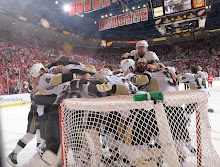
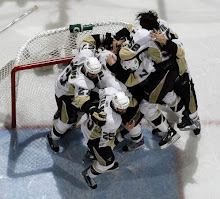










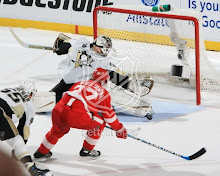

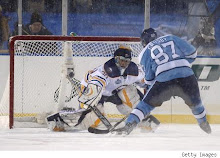
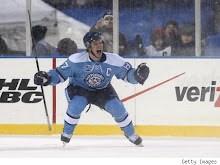


No comments:
Post a Comment